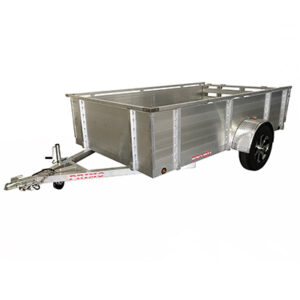You don’t need to own a huge gas-guzzling truck to run hauling errands. Instead, consider investing in a utility trailer. It will come in handy more often than you think. Skip paying extra for delivery of furniture and appliances, haul recreational vehicles like ATVs, and easily take trash to the dump. If you’re considering a trailer purchase but aren’t sure what type you’ll need, keep reading for a utility trailer buying guide.
What Will You Use It For?
When considering what type of utility trailer to buy, the first thing to ask yourself is what you’ll use it for. Of course, it’ll end up serving more functions than you originally plan for, especially when your friends see it and call on you to help them move. But the main thing to consider is the type of load you’ll normally carry. For basic requirements like hauling a lawnmower or for doing household trash runs, a 5′ x 8′ should be sufficient. For bigger projects like hauling tractors or bobcats, you might need a 7′ x 16′ or 7′ x 18′ equipment trailer. The general rule of thumb is to go a bit bigger than what you think you’ll need.
How Much Weight Can Your Vehicle Tow?
Once you’ve determined what you’ll use the trailer for, the next step is to look at your vehicle specifications to find out its towing capacity. You can find a vehicle’s maximum towing capacity in the owner’s manual or by calling the dealership to ask. Keep in mind, the vehicle’s towing capacity will be the weight of the trailer plus the weight of the cargo it’s carrying. It’s important to consider both the pulling capacity of the vehicle as well as the stopping capacity. It takes longer to stop if the trailer and the cargo weigh more than the vehicle itself.
Utility Trailer Buying Guide
After determining your specific needs and your vehicle’s towing capacity, consider what add-ons and storage requirements you’ll need. For instance, you might need a trailer with sides if you’re planning to haul loose debris like mulch. If you’re planning on hauling recreational equipment like ATVs or larger lawn equipment, you might need a ramp. If your vehicle doesn’t already have a trailer hitch, you can install one. Regarding size, it’s standard advice to buy a trailer that is the same width or a bit wider than the towing vehicle. This improves maneuverability and reduces wind drag. Make sure to check out the legal size requirements in your area and measure your storage space to ensure it’ll fit. Some communities and counties don’t allow trailer storage on the street. Make sure you have the proper storage facilities to avoid an unnecessary penalty. So, what is the best utility trailer for the money? Check out these options. Also, consider buying used.
Hitting the Dusty Trail
Utility trailers are a handy accessory to have and can make any project go faster and smoother. We hope this utility trailer buying guide has answered your questions about what type of trailer you need. Contact us today to inquire about deals or to speak to one of our trailer experts. Happy hauling!
